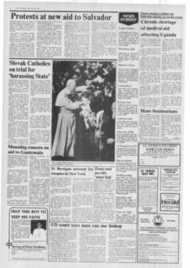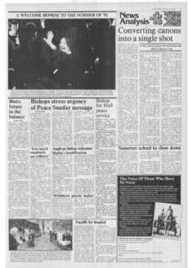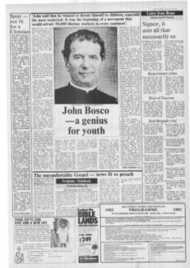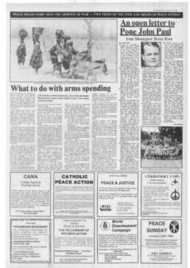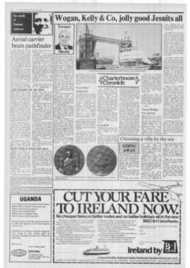Page 1, 28th January 1983
Page 1

Report an error
Noticed an error on this page?If you've noticed an error in this article please click here to report it.
Tags
Share
Related articles
Us Bishops Curb Hard Peace Line
National Nuclear Policy Fails To Match Up To Catholic...
Americans Fly In To Seek Nuclear Agreement
Disarming Bishop Meets Cardinal Hume In London
From The Bishops' Diaries
Rome meeting discusses US bishops' nuclear draft
Bishops in bid to avert war
THE CHURCH is not engaged in multiple initiatives to forestall nuclear war.
Bishops from seven episcopates met in the Vatican on January 18-19 to discuss the United States bishops' draft statement on nuclear arms.
On January 13-15 representatives of the major religions met in Vienna to discuss the statement on preventing nuclear war, prepared last September by the Pontifical Academy of Science.
The East German episcopacy issued a pastoral letter on the arms race and other matters for the New Year: the West German episcopacy is reportedly preparing a statement on nuclear weapons and other episcopates are expected to follow suit.
Naturally the Vatican wants co-ordination to avoid contrasts between the various episcopal statements. It wants them to share doctrine and also take into account Vatican declarations on the theme.
Cardinal-designate Joseph Bernadin said after the meeting in the old synod hall that the United States Bishops' statement will be modified because of the Vatican discussions. At the North American College in Rome Archbishop Bernadin said that, before the final version of the statement comes before the United States episcopal conference early in May, the passages on deterrents will be better articulated, the differences between the United States and Russian political systems will be clarified, the sections on the two superpowers' responsibilities will be reworked, and doctrinal 't's' will be crossed However, Archbishop Bernadin asserted that the main lines of the document will remain unchanged.
It is believed West German participants were among the most critical of the draft document, representatives of the English, French, Italian, Dutch and Belgian episcopates also participated in the two-day Vatican meeting along with Cardinal Agostino Casaroli, Secretary of State, his number two Archbishop Achille Silvestrini and Cardinal Joseph Ratzinger the German theologian who heads the congregation for the Doctrine of the Faith. This indicated Vatican awareness of the possible diplomatic repercussions and doctrinal implications of the United States Bishops' proposed statement.
It is said the Vatican's man in
From Desmond O'Grady in Rome
Washington, Archbishop Pio Laghi, pushed for the Vatican meeting as a means of amending the document and so obtain a fuller consensus among United States bishops: a straw vote on the second draft showed that only 12 rejected it against the 170 who accepted it but there were also a hundred who wanted revision.
With West German elections in March and installation of new American missiles in Europe set for later this year, there will be keen interest when the West German episcopate speaks on nuclear arms as is expected in coming months.
East German bishops, in their New Year pastoral letter, deplored pro-military education with courses even for 14-year olds, the military propayeanda on radio and television, and the failure to recognise the rights of conscientious objectors.
In East Germany there is a
limited recognition of conscientious objection in that military service can be done in non-combat units.
They also deplored the arms race even in East Europe; a common German Catholic policy could emerge if the West German Episcopal Conference statement coincides with that of the East German bishops.
On January 14-15 Cardinaldesignate Joachim Meisner Archbishop of Berlin (which for the Vatican is an undivided city) and President of the East German Episcopal Conference, had talks in Cologne with Cardinal Joseph Hof fner President of the West German Episcopal Conference.
It is highly likely that they spoke of peace and disarmament which, among other topics, had been discussed for the previous three days at a meeting in Lyons between Cardinal Hoffner and Bishop Jean Vilnet, President of
the French Episcopal Conference.
At the same time an attempt to foster a common religious, and not simply a Catholic or even Christian, attitude to nuclear arms was made by Cardinal Franz Koenig in a meeting he organised in Vienna.
He aimed to foster initiatives based on the pontifical Academy of Science's statement against nuclear war.
In that document, the scientists appealed to all religious leaders and custodians of moral principles to "proclaim with force and insistence the gravity of the human problems involved so they may be fully
understood and felt by society". Catholic, Protestants, Orthodox, Anglicans, Jews, Muslims, Copts, Buddhists and followers of Hinduism participated.
Among those present were Archbishop John Roach, president of the United States Episcopal Conference, Father Theodore Hesburgh, President of the University of Notre Dame, and Methodist Bishop James Armstrong, President of the United States National Council of Churches.
During the second Vatican council', Americans such as Cardinal Francis Spellman and Archbishop Philip Hannan of New Orleans opposed those such as the Melchite Patriarch Maximos IV who said "we can rouse world public opinion against nuclear arms".
Presumably Cardinal Spellman and Archbishop Hannan's objections were based ultimately on a concept of prudence — an awareness of the realities of a situation which is the basis of all virtuous action.
They considered that the council, by ignoring hard realities, would become merely demagogic.
They were accused of dousing prophecy, that was in 1964, but 18 years later, roles have changed: bishops of other nations seem to be reminding the United States bishops of "hard realities" which must be taken into account when attempting to be prophetic. It remains to be seen if, once the realities are taken into account, the statements will be more than otiose.
blog comments powered by Disqus



